Jeremy's Recovery and Mental Health Principles
VerifiedAdded on 2020/04/01
|7
|1967
|62
AI Summary
This assignment examines Jeremy Oxley's recovery from schizophrenia by analyzing his use of art and music as therapeutic outlets. The essay compares his personal journey with the principles outlined in the National Recovery Framework for mental health services, highlighting the importance of self-expression, dignity, respect, and social connection in the recovery process.
Contribute Materials
Your contribution can guide someone’s learning journey. Share your
documents today.
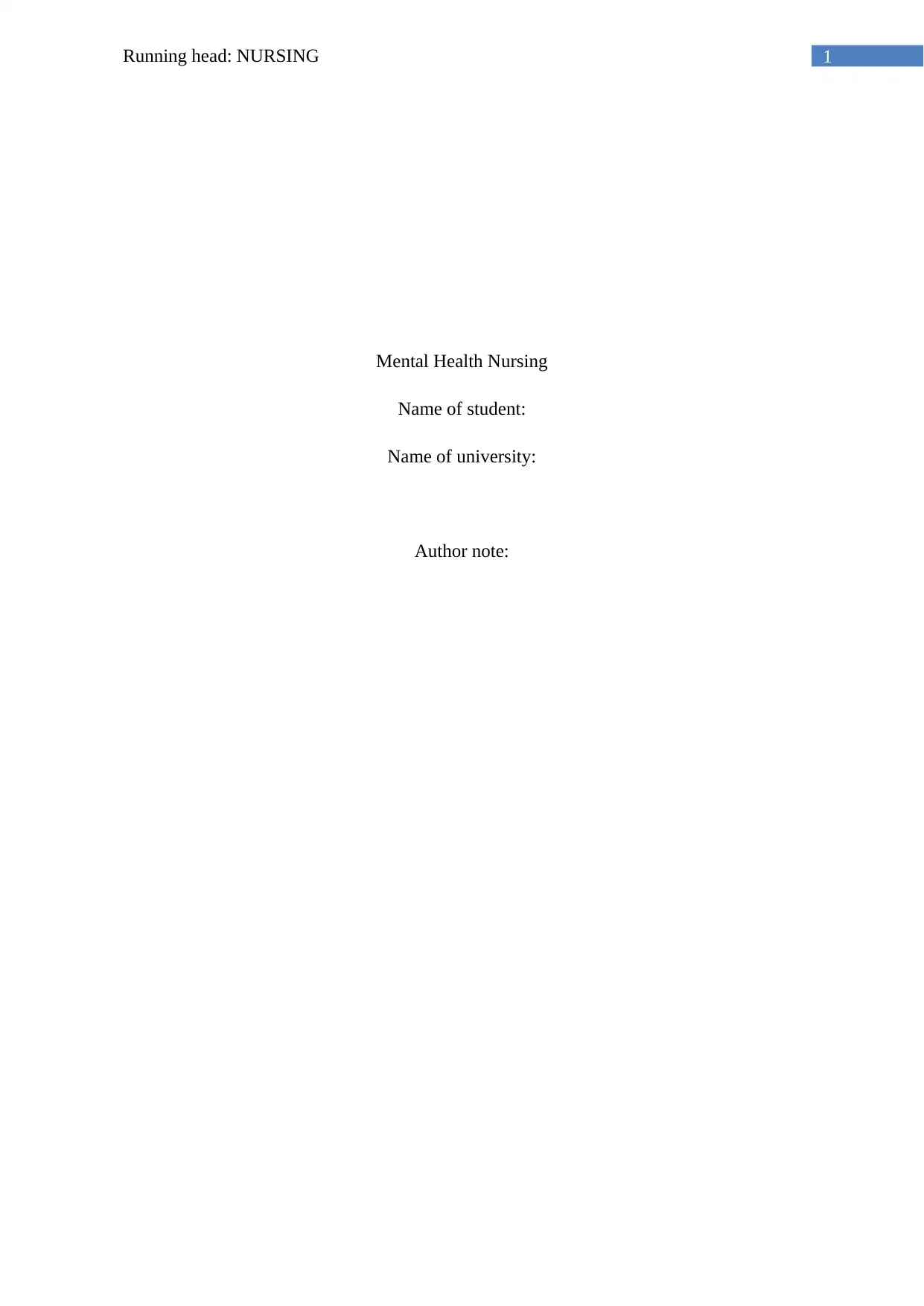
1Running head: NURSING
Mental Health Nursing
Name of student:
Name of university:
Author note:
Mental Health Nursing
Name of student:
Name of university:
Author note:
Secure Best Marks with AI Grader
Need help grading? Try our AI Grader for instant feedback on your assignments.
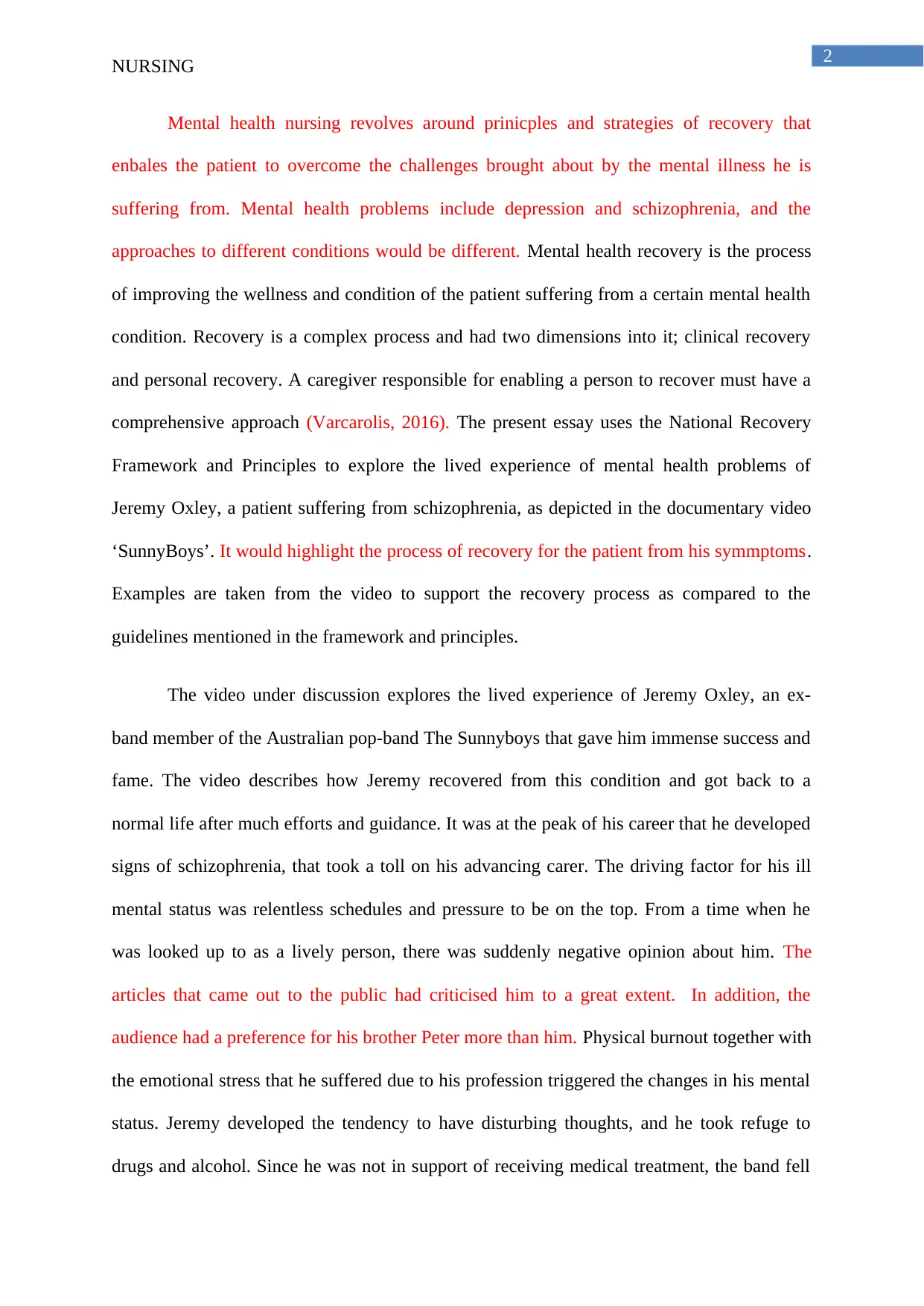
2
NURSING
Mental health nursing revolves around prinicples and strategies of recovery that
enbales the patient to overcome the challenges brought about by the mental illness he is
suffering from. Mental health problems include depression and schizophrenia, and the
approaches to different conditions would be different. Mental health recovery is the process
of improving the wellness and condition of the patient suffering from a certain mental health
condition. Recovery is a complex process and had two dimensions into it; clinical recovery
and personal recovery. A caregiver responsible for enabling a person to recover must have a
comprehensive approach (Varcarolis, 2016). The present essay uses the National Recovery
Framework and Principles to explore the lived experience of mental health problems of
Jeremy Oxley, a patient suffering from schizophrenia, as depicted in the documentary video
‘SunnyBoys’. It would highlight the process of recovery for the patient from his symmptoms.
Examples are taken from the video to support the recovery process as compared to the
guidelines mentioned in the framework and principles.
The video under discussion explores the lived experience of Jeremy Oxley, an ex-
band member of the Australian pop-band The Sunnyboys that gave him immense success and
fame. The video describes how Jeremy recovered from this condition and got back to a
normal life after much efforts and guidance. It was at the peak of his career that he developed
signs of schizophrenia, that took a toll on his advancing carer. The driving factor for his ill
mental status was relentless schedules and pressure to be on the top. From a time when he
was looked up to as a lively person, there was suddenly negative opinion about him. The
articles that came out to the public had criticised him to a great extent. In addition, the
audience had a preference for his brother Peter more than him. Physical burnout together with
the emotional stress that he suffered due to his profession triggered the changes in his mental
status. Jeremy developed the tendency to have disturbing thoughts, and he took refuge to
drugs and alcohol. Since he was not in support of receiving medical treatment, the band fell
NURSING
Mental health nursing revolves around prinicples and strategies of recovery that
enbales the patient to overcome the challenges brought about by the mental illness he is
suffering from. Mental health problems include depression and schizophrenia, and the
approaches to different conditions would be different. Mental health recovery is the process
of improving the wellness and condition of the patient suffering from a certain mental health
condition. Recovery is a complex process and had two dimensions into it; clinical recovery
and personal recovery. A caregiver responsible for enabling a person to recover must have a
comprehensive approach (Varcarolis, 2016). The present essay uses the National Recovery
Framework and Principles to explore the lived experience of mental health problems of
Jeremy Oxley, a patient suffering from schizophrenia, as depicted in the documentary video
‘SunnyBoys’. It would highlight the process of recovery for the patient from his symmptoms.
Examples are taken from the video to support the recovery process as compared to the
guidelines mentioned in the framework and principles.
The video under discussion explores the lived experience of Jeremy Oxley, an ex-
band member of the Australian pop-band The Sunnyboys that gave him immense success and
fame. The video describes how Jeremy recovered from this condition and got back to a
normal life after much efforts and guidance. It was at the peak of his career that he developed
signs of schizophrenia, that took a toll on his advancing carer. The driving factor for his ill
mental status was relentless schedules and pressure to be on the top. From a time when he
was looked up to as a lively person, there was suddenly negative opinion about him. The
articles that came out to the public had criticised him to a great extent. In addition, the
audience had a preference for his brother Peter more than him. Physical burnout together with
the emotional stress that he suffered due to his profession triggered the changes in his mental
status. Jeremy developed the tendency to have disturbing thoughts, and he took refuge to
drugs and alcohol. Since he was not in support of receiving medical treatment, the band fell
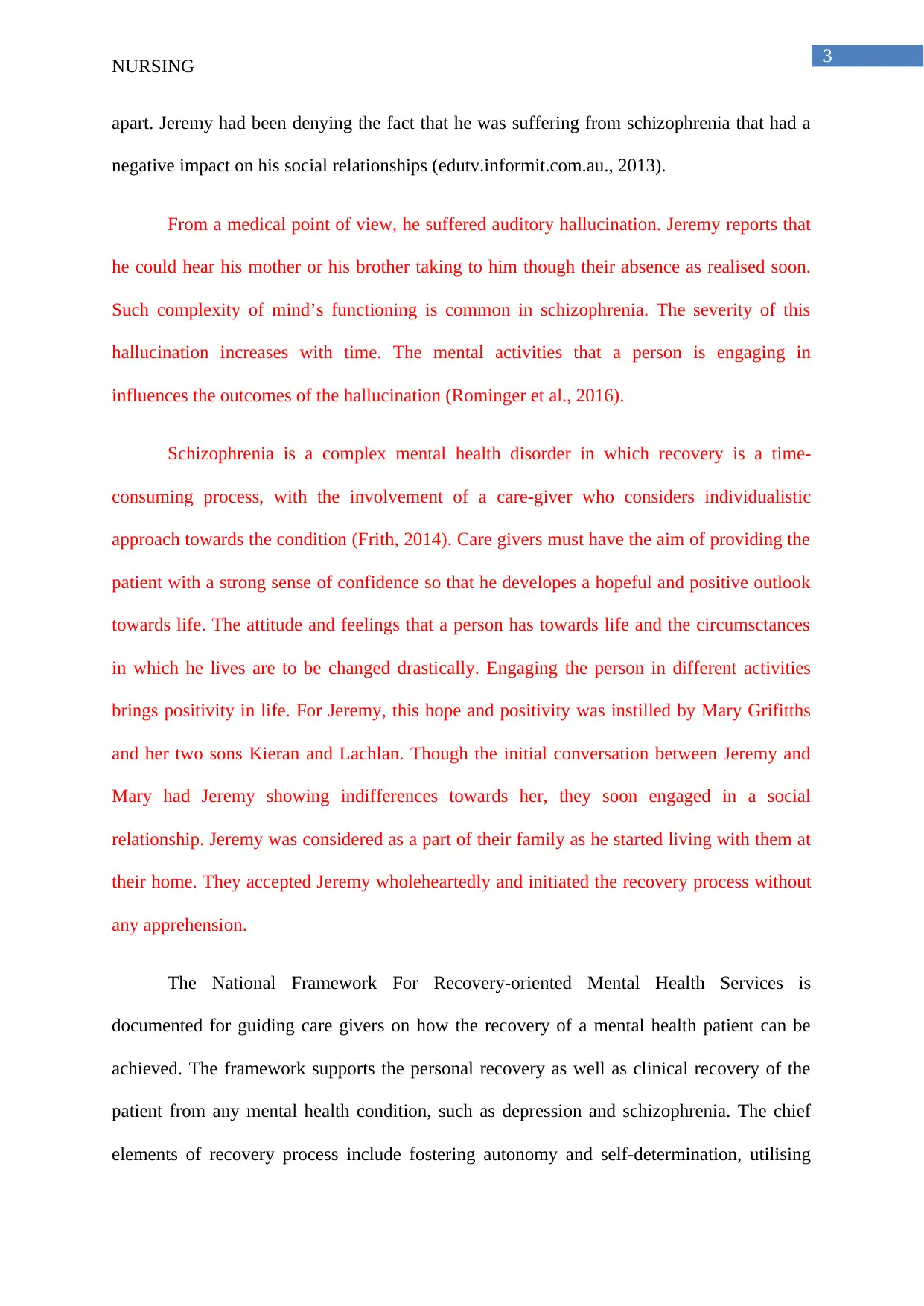
3
NURSING
apart. Jeremy had been denying the fact that he was suffering from schizophrenia that had a
negative impact on his social relationships (edutv.informit.com.au., 2013).
From a medical point of view, he suffered auditory hallucination. Jeremy reports that
he could hear his mother or his brother taking to him though their absence as realised soon.
Such complexity of mind’s functioning is common in schizophrenia. The severity of this
hallucination increases with time. The mental activities that a person is engaging in
influences the outcomes of the hallucination (Rominger et al., 2016).
Schizophrenia is a complex mental health disorder in which recovery is a time-
consuming process, with the involvement of a care-giver who considers individualistic
approach towards the condition (Frith, 2014). Care givers must have the aim of providing the
patient with a strong sense of confidence so that he developes a hopeful and positive outlook
towards life. The attitude and feelings that a person has towards life and the circumsctances
in which he lives are to be changed drastically. Engaging the person in different activities
brings positivity in life. For Jeremy, this hope and positivity was instilled by Mary Grifitths
and her two sons Kieran and Lachlan. Though the initial conversation between Jeremy and
Mary had Jeremy showing indifferences towards her, they soon engaged in a social
relationship. Jeremy was considered as a part of their family as he started living with them at
their home. They accepted Jeremy wholeheartedly and initiated the recovery process without
any apprehension.
The National Framework For Recovery-oriented Mental Health Services is
documented for guiding care givers on how the recovery of a mental health patient can be
achieved. The framework supports the personal recovery as well as clinical recovery of the
patient from any mental health condition, such as depression and schizophrenia. The chief
elements of recovery process include fostering autonomy and self-determination, utilising
NURSING
apart. Jeremy had been denying the fact that he was suffering from schizophrenia that had a
negative impact on his social relationships (edutv.informit.com.au., 2013).
From a medical point of view, he suffered auditory hallucination. Jeremy reports that
he could hear his mother or his brother taking to him though their absence as realised soon.
Such complexity of mind’s functioning is common in schizophrenia. The severity of this
hallucination increases with time. The mental activities that a person is engaging in
influences the outcomes of the hallucination (Rominger et al., 2016).
Schizophrenia is a complex mental health disorder in which recovery is a time-
consuming process, with the involvement of a care-giver who considers individualistic
approach towards the condition (Frith, 2014). Care givers must have the aim of providing the
patient with a strong sense of confidence so that he developes a hopeful and positive outlook
towards life. The attitude and feelings that a person has towards life and the circumsctances
in which he lives are to be changed drastically. Engaging the person in different activities
brings positivity in life. For Jeremy, this hope and positivity was instilled by Mary Grifitths
and her two sons Kieran and Lachlan. Though the initial conversation between Jeremy and
Mary had Jeremy showing indifferences towards her, they soon engaged in a social
relationship. Jeremy was considered as a part of their family as he started living with them at
their home. They accepted Jeremy wholeheartedly and initiated the recovery process without
any apprehension.
The National Framework For Recovery-oriented Mental Health Services is
documented for guiding care givers on how the recovery of a mental health patient can be
achieved. The framework supports the personal recovery as well as clinical recovery of the
patient from any mental health condition, such as depression and schizophrenia. The chief
elements of recovery process include fostering autonomy and self-determination, utilising
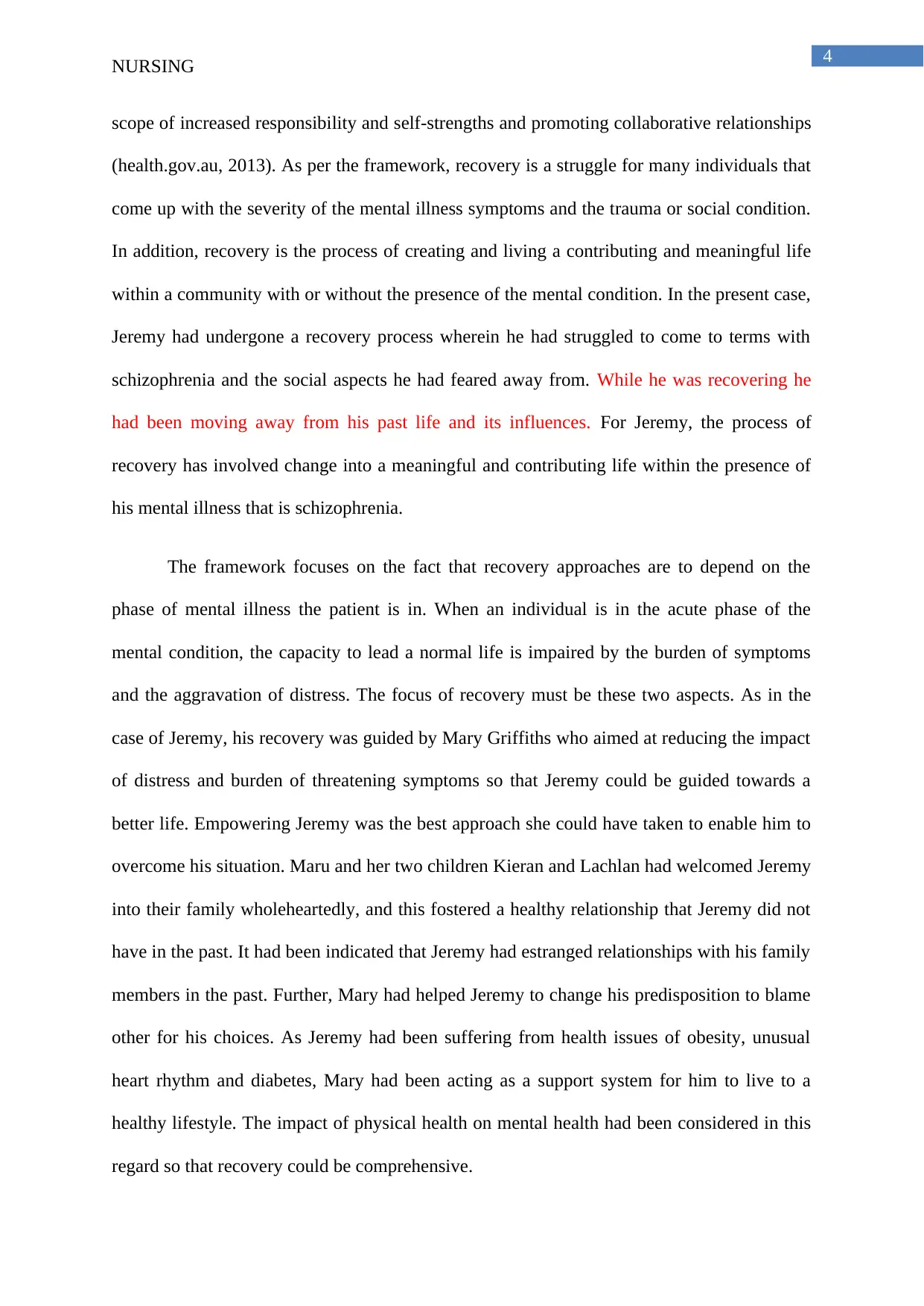
4
NURSING
scope of increased responsibility and self-strengths and promoting collaborative relationships
(health.gov.au, 2013). As per the framework, recovery is a struggle for many individuals that
come up with the severity of the mental illness symptoms and the trauma or social condition.
In addition, recovery is the process of creating and living a contributing and meaningful life
within a community with or without the presence of the mental condition. In the present case,
Jeremy had undergone a recovery process wherein he had struggled to come to terms with
schizophrenia and the social aspects he had feared away from. While he was recovering he
had been moving away from his past life and its influences. For Jeremy, the process of
recovery has involved change into a meaningful and contributing life within the presence of
his mental illness that is schizophrenia.
The framework focuses on the fact that recovery approaches are to depend on the
phase of mental illness the patient is in. When an individual is in the acute phase of the
mental condition, the capacity to lead a normal life is impaired by the burden of symptoms
and the aggravation of distress. The focus of recovery must be these two aspects. As in the
case of Jeremy, his recovery was guided by Mary Griffiths who aimed at reducing the impact
of distress and burden of threatening symptoms so that Jeremy could be guided towards a
better life. Empowering Jeremy was the best approach she could have taken to enable him to
overcome his situation. Maru and her two children Kieran and Lachlan had welcomed Jeremy
into their family wholeheartedly, and this fostered a healthy relationship that Jeremy did not
have in the past. It had been indicated that Jeremy had estranged relationships with his family
members in the past. Further, Mary had helped Jeremy to change his predisposition to blame
other for his choices. As Jeremy had been suffering from health issues of obesity, unusual
heart rhythm and diabetes, Mary had been acting as a support system for him to live to a
healthy lifestyle. The impact of physical health on mental health had been considered in this
regard so that recovery could be comprehensive.
NURSING
scope of increased responsibility and self-strengths and promoting collaborative relationships
(health.gov.au, 2013). As per the framework, recovery is a struggle for many individuals that
come up with the severity of the mental illness symptoms and the trauma or social condition.
In addition, recovery is the process of creating and living a contributing and meaningful life
within a community with or without the presence of the mental condition. In the present case,
Jeremy had undergone a recovery process wherein he had struggled to come to terms with
schizophrenia and the social aspects he had feared away from. While he was recovering he
had been moving away from his past life and its influences. For Jeremy, the process of
recovery has involved change into a meaningful and contributing life within the presence of
his mental illness that is schizophrenia.
The framework focuses on the fact that recovery approaches are to depend on the
phase of mental illness the patient is in. When an individual is in the acute phase of the
mental condition, the capacity to lead a normal life is impaired by the burden of symptoms
and the aggravation of distress. The focus of recovery must be these two aspects. As in the
case of Jeremy, his recovery was guided by Mary Griffiths who aimed at reducing the impact
of distress and burden of threatening symptoms so that Jeremy could be guided towards a
better life. Empowering Jeremy was the best approach she could have taken to enable him to
overcome his situation. Maru and her two children Kieran and Lachlan had welcomed Jeremy
into their family wholeheartedly, and this fostered a healthy relationship that Jeremy did not
have in the past. It had been indicated that Jeremy had estranged relationships with his family
members in the past. Further, Mary had helped Jeremy to change his predisposition to blame
other for his choices. As Jeremy had been suffering from health issues of obesity, unusual
heart rhythm and diabetes, Mary had been acting as a support system for him to live to a
healthy lifestyle. The impact of physical health on mental health had been considered in this
regard so that recovery could be comprehensive.
Secure Best Marks with AI Grader
Need help grading? Try our AI Grader for instant feedback on your assignments.
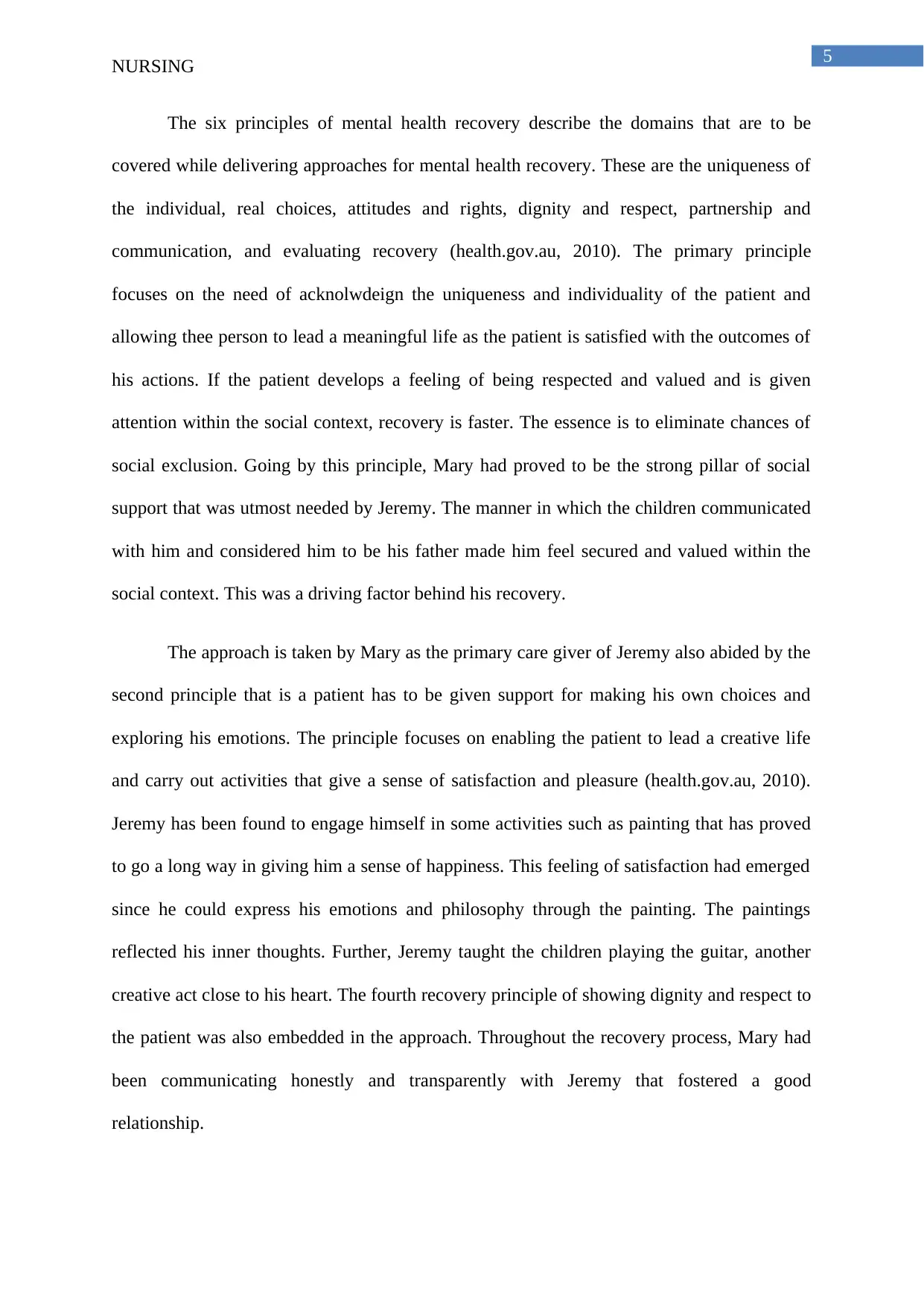
5
NURSING
The six principles of mental health recovery describe the domains that are to be
covered while delivering approaches for mental health recovery. These are the uniqueness of
the individual, real choices, attitudes and rights, dignity and respect, partnership and
communication, and evaluating recovery (health.gov.au, 2010). The primary principle
focuses on the need of acknolwdeign the uniqueness and individuality of the patient and
allowing thee person to lead a meaningful life as the patient is satisfied with the outcomes of
his actions. If the patient develops a feeling of being respected and valued and is given
attention within the social context, recovery is faster. The essence is to eliminate chances of
social exclusion. Going by this principle, Mary had proved to be the strong pillar of social
support that was utmost needed by Jeremy. The manner in which the children communicated
with him and considered him to be his father made him feel secured and valued within the
social context. This was a driving factor behind his recovery.
The approach is taken by Mary as the primary care giver of Jeremy also abided by the
second principle that is a patient has to be given support for making his own choices and
exploring his emotions. The principle focuses on enabling the patient to lead a creative life
and carry out activities that give a sense of satisfaction and pleasure (health.gov.au, 2010).
Jeremy has been found to engage himself in some activities such as painting that has proved
to go a long way in giving him a sense of happiness. This feeling of satisfaction had emerged
since he could express his emotions and philosophy through the painting. The paintings
reflected his inner thoughts. Further, Jeremy taught the children playing the guitar, another
creative act close to his heart. The fourth recovery principle of showing dignity and respect to
the patient was also embedded in the approach. Throughout the recovery process, Mary had
been communicating honestly and transparently with Jeremy that fostered a good
relationship.
NURSING
The six principles of mental health recovery describe the domains that are to be
covered while delivering approaches for mental health recovery. These are the uniqueness of
the individual, real choices, attitudes and rights, dignity and respect, partnership and
communication, and evaluating recovery (health.gov.au, 2010). The primary principle
focuses on the need of acknolwdeign the uniqueness and individuality of the patient and
allowing thee person to lead a meaningful life as the patient is satisfied with the outcomes of
his actions. If the patient develops a feeling of being respected and valued and is given
attention within the social context, recovery is faster. The essence is to eliminate chances of
social exclusion. Going by this principle, Mary had proved to be the strong pillar of social
support that was utmost needed by Jeremy. The manner in which the children communicated
with him and considered him to be his father made him feel secured and valued within the
social context. This was a driving factor behind his recovery.
The approach is taken by Mary as the primary care giver of Jeremy also abided by the
second principle that is a patient has to be given support for making his own choices and
exploring his emotions. The principle focuses on enabling the patient to lead a creative life
and carry out activities that give a sense of satisfaction and pleasure (health.gov.au, 2010).
Jeremy has been found to engage himself in some activities such as painting that has proved
to go a long way in giving him a sense of happiness. This feeling of satisfaction had emerged
since he could express his emotions and philosophy through the painting. The paintings
reflected his inner thoughts. Further, Jeremy taught the children playing the guitar, another
creative act close to his heart. The fourth recovery principle of showing dignity and respect to
the patient was also embedded in the approach. Throughout the recovery process, Mary had
been communicating honestly and transparently with Jeremy that fostered a good
relationship.
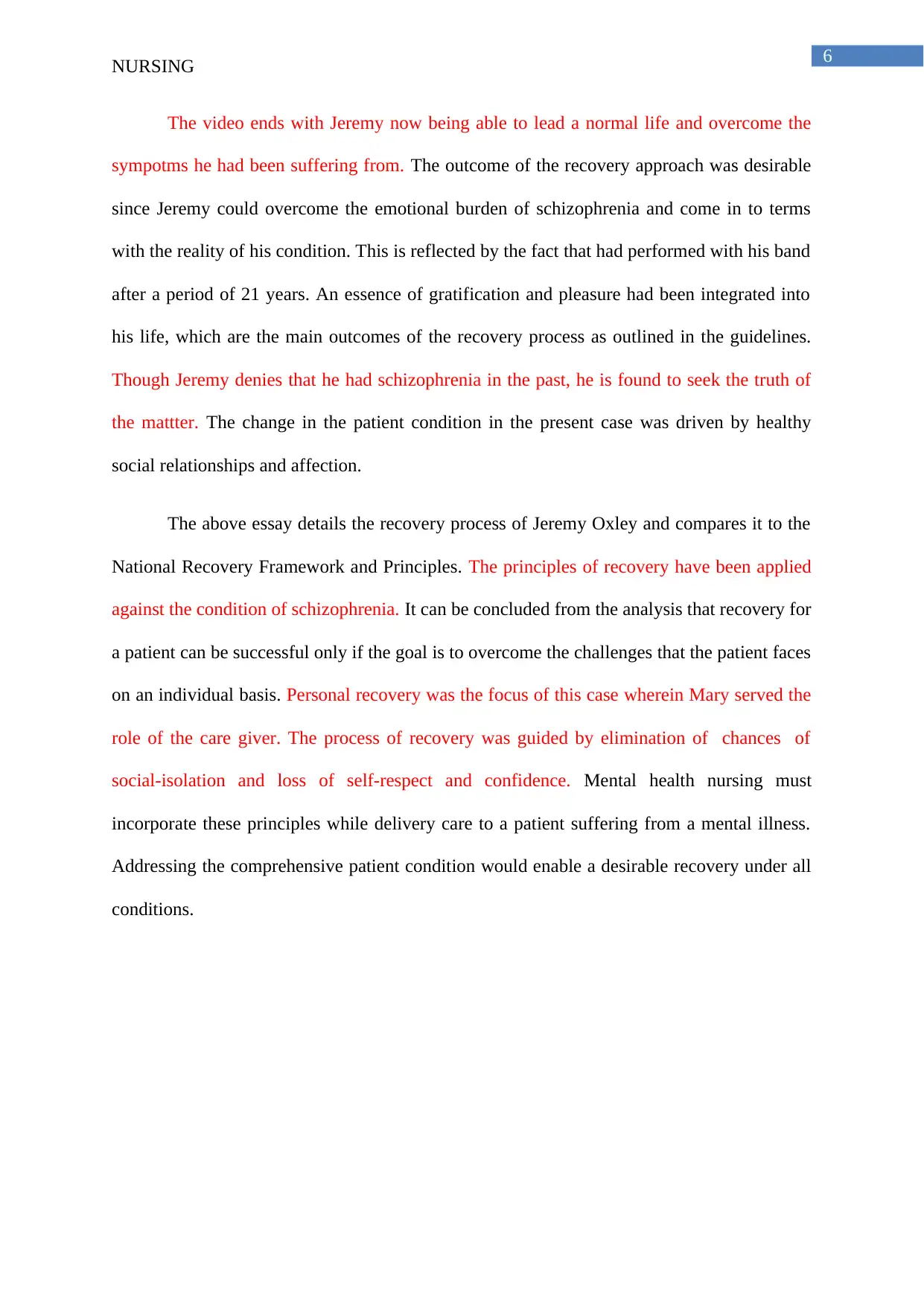
6
NURSING
The video ends with Jeremy now being able to lead a normal life and overcome the
sympotms he had been suffering from. The outcome of the recovery approach was desirable
since Jeremy could overcome the emotional burden of schizophrenia and come in to terms
with the reality of his condition. This is reflected by the fact that had performed with his band
after a period of 21 years. An essence of gratification and pleasure had been integrated into
his life, which are the main outcomes of the recovery process as outlined in the guidelines.
Though Jeremy denies that he had schizophrenia in the past, he is found to seek the truth of
the mattter. The change in the patient condition in the present case was driven by healthy
social relationships and affection.
The above essay details the recovery process of Jeremy Oxley and compares it to the
National Recovery Framework and Principles. The principles of recovery have been applied
against the condition of schizophrenia. It can be concluded from the analysis that recovery for
a patient can be successful only if the goal is to overcome the challenges that the patient faces
on an individual basis. Personal recovery was the focus of this case wherein Mary served the
role of the care giver. The process of recovery was guided by elimination of chances of
social-isolation and loss of self-respect and confidence. Mental health nursing must
incorporate these principles while delivery care to a patient suffering from a mental illness.
Addressing the comprehensive patient condition would enable a desirable recovery under all
conditions.
NURSING
The video ends with Jeremy now being able to lead a normal life and overcome the
sympotms he had been suffering from. The outcome of the recovery approach was desirable
since Jeremy could overcome the emotional burden of schizophrenia and come in to terms
with the reality of his condition. This is reflected by the fact that had performed with his band
after a period of 21 years. An essence of gratification and pleasure had been integrated into
his life, which are the main outcomes of the recovery process as outlined in the guidelines.
Though Jeremy denies that he had schizophrenia in the past, he is found to seek the truth of
the mattter. The change in the patient condition in the present case was driven by healthy
social relationships and affection.
The above essay details the recovery process of Jeremy Oxley and compares it to the
National Recovery Framework and Principles. The principles of recovery have been applied
against the condition of schizophrenia. It can be concluded from the analysis that recovery for
a patient can be successful only if the goal is to overcome the challenges that the patient faces
on an individual basis. Personal recovery was the focus of this case wherein Mary served the
role of the care giver. The process of recovery was guided by elimination of chances of
social-isolation and loss of self-respect and confidence. Mental health nursing must
incorporate these principles while delivery care to a patient suffering from a mental illness.
Addressing the comprehensive patient condition would enable a desirable recovery under all
conditions.
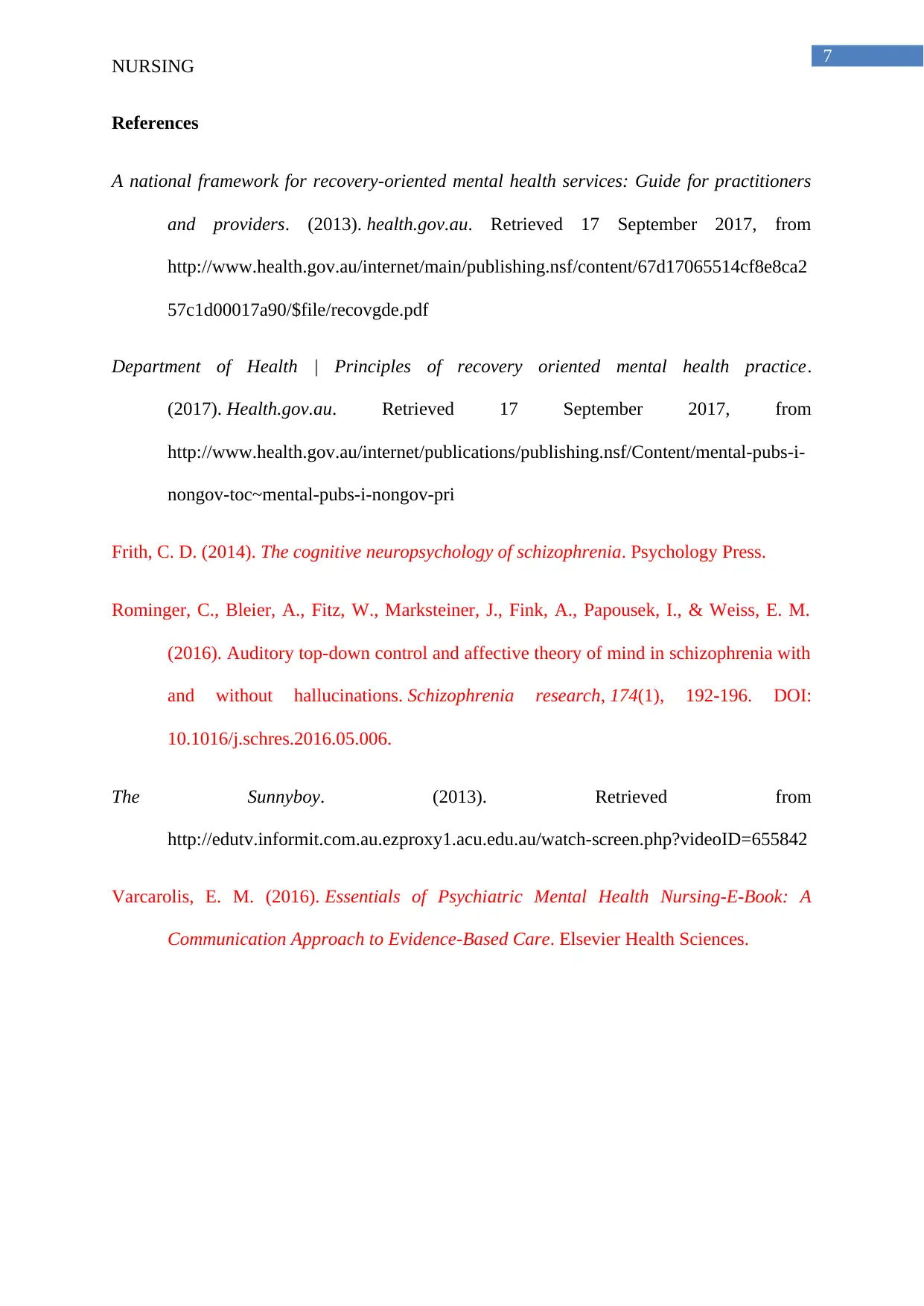
7
NURSING
References
A national framework for recovery-oriented mental health services: Guide for practitioners
and providers. (2013). health.gov.au. Retrieved 17 September 2017, from
http://www.health.gov.au/internet/main/publishing.nsf/content/67d17065514cf8e8ca2
57c1d00017a90/$file/recovgde.pdf
Department of Health | Principles of recovery oriented mental health practice.
(2017). Health.gov.au. Retrieved 17 September 2017, from
http://www.health.gov.au/internet/publications/publishing.nsf/Content/mental-pubs-i-
nongov-toc~mental-pubs-i-nongov-pri
Frith, C. D. (2014). The cognitive neuropsychology of schizophrenia. Psychology Press.
Rominger, C., Bleier, A., Fitz, W., Marksteiner, J., Fink, A., Papousek, I., & Weiss, E. M.
(2016). Auditory top-down control and affective theory of mind in schizophrenia with
and without hallucinations. Schizophrenia research, 174(1), 192-196. DOI:
10.1016/j.schres.2016.05.006.
The Sunnyboy. (2013). Retrieved from
http://edutv.informit.com.au.ezproxy1.acu.edu.au/watch-screen.php?videoID=655842
Varcarolis, E. M. (2016). Essentials of Psychiatric Mental Health Nursing-E-Book: A
Communication Approach to Evidence-Based Care. Elsevier Health Sciences.
NURSING
References
A national framework for recovery-oriented mental health services: Guide for practitioners
and providers. (2013). health.gov.au. Retrieved 17 September 2017, from
http://www.health.gov.au/internet/main/publishing.nsf/content/67d17065514cf8e8ca2
57c1d00017a90/$file/recovgde.pdf
Department of Health | Principles of recovery oriented mental health practice.
(2017). Health.gov.au. Retrieved 17 September 2017, from
http://www.health.gov.au/internet/publications/publishing.nsf/Content/mental-pubs-i-
nongov-toc~mental-pubs-i-nongov-pri
Frith, C. D. (2014). The cognitive neuropsychology of schizophrenia. Psychology Press.
Rominger, C., Bleier, A., Fitz, W., Marksteiner, J., Fink, A., Papousek, I., & Weiss, E. M.
(2016). Auditory top-down control and affective theory of mind in schizophrenia with
and without hallucinations. Schizophrenia research, 174(1), 192-196. DOI:
10.1016/j.schres.2016.05.006.
The Sunnyboy. (2013). Retrieved from
http://edutv.informit.com.au.ezproxy1.acu.edu.au/watch-screen.php?videoID=655842
Varcarolis, E. M. (2016). Essentials of Psychiatric Mental Health Nursing-E-Book: A
Communication Approach to Evidence-Based Care. Elsevier Health Sciences.
1 out of 7
Related Documents
Your All-in-One AI-Powered Toolkit for Academic Success.
+13062052269
info@desklib.com
Available 24*7 on WhatsApp / Email
![[object Object]](/_next/static/media/star-bottom.7253800d.svg)
Unlock your academic potential
© 2024 | Zucol Services PVT LTD | All rights reserved.





